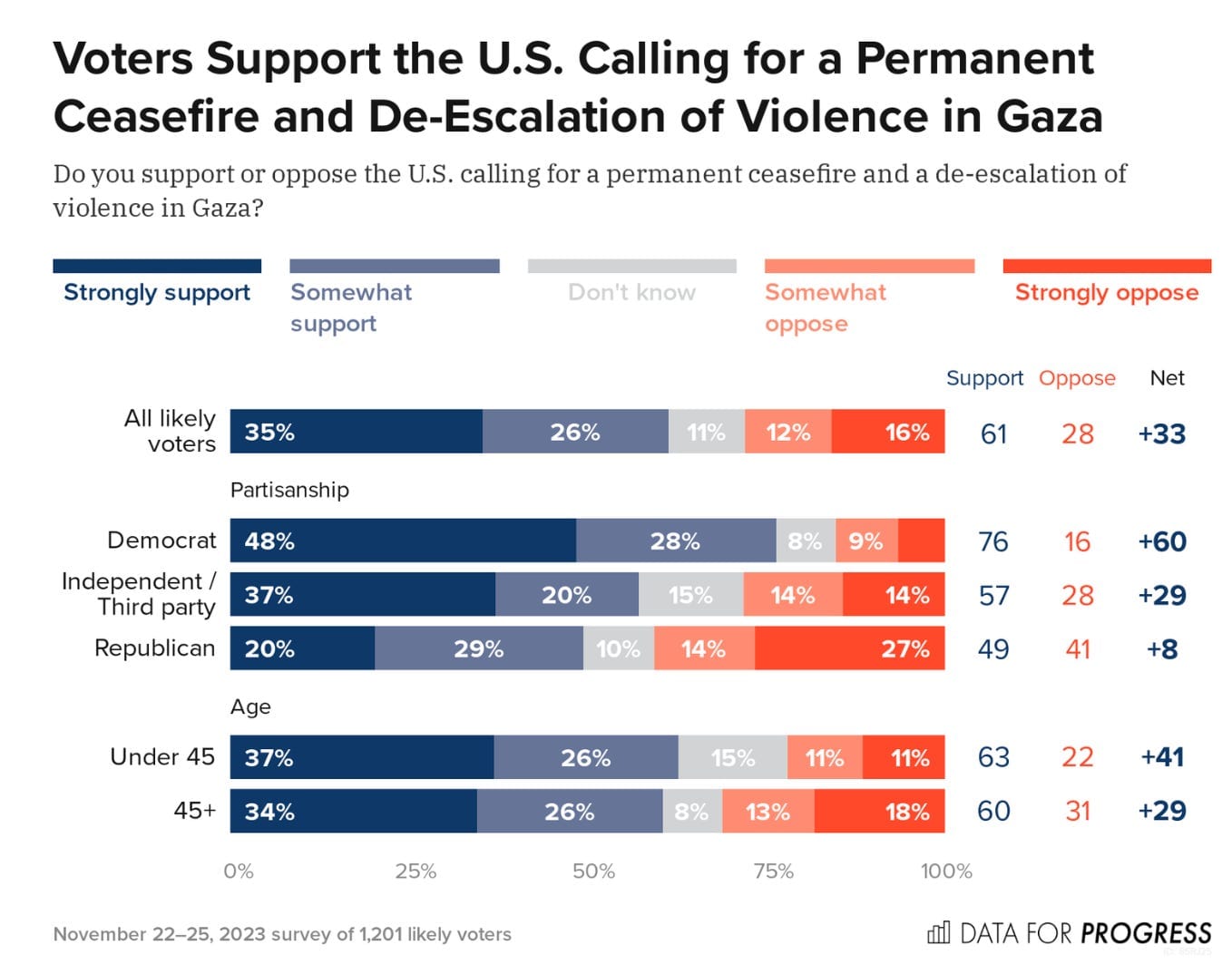
🌱 The Strains of a Two-Party System
Part I: Democracy, The Democratic Party, & Easing into the 2024 Election
🤓 Bite-Sized Knurd: The Hamas terrorist attack and Israel’s violent response have caused a seismic shift in the Democratic Party, a month before an election year. This week, we look at our two-party system and the implications for the 2024 election.
In Case You Missed It: Navigating Trauma & Healing in a Brutal World
🎧 Listen to Today’s Post🎙
We experienced a seismic shift in the U.S. political ecosystem in October.
We’ll have to wait for the historians to unveil just how seismic it was, but we have early signs that the Democratic Party will be fundamentally changed by the October 7th Hamas terrorist attack and Israel’s violent response to it (AP News).
The left’s fissures are beginning to split out in the open just like the Republican’s since Trump’s fateful escalator ride in 2019 (roc). Democratic voters are overwhelmingly supportive of a permanent ceasefire (data for progress). Meanwhile, only 60 members of Congress, all Democrats, have supported a ceasefire, four of whom are Senators (WFP Ceasefire Tracker). This is after two months of violence with over 16,000 human lives lost. All human life is precious, but it’s important to note that 6,000 of those lives were children (Al Jazeera). So it’s less of an even split with voters and more a split between the party establishment and its own voters.
It’s a bit concerning that the Democratic Party is not aligned with its voters when we are dashing (🦌 ’tis the season) towards an election year where the only clear candidates are the current president who is losing voters from his own party and a second Trump term that will tilt full fascism if we let him back into the White House. We don’t have to guess, they’ve already told us what will happen (AP News).
The Hamas terrorist attacks in Israel and the genocide in Gaza have made the rift more visible in the Democratic Party, but it’s been brewing since before the pot boiled over during the 2020 uprisings (more on that next week!). 2024 will be a boiling point for both parties, the country, and frankly the world because of our undue influence.
So this month and in January, I wanted to ease us into the 2024 election, understand the landscape and stakes of the election, and most importantly what we can do about it. We may be in dark times, but I have so much hope because of the power we hold to change things (keep calling! 🍉).
The Strains of a Two-Party System
The nature of the United States’ version of democracy and our two-party system makes it impossible to truly understand the kinds of factions that are present in this country. Progressives are intermixed with moderate liberals, while insurrectionists duke it out with trickle-down capitalists on the right. Meanwhile, the less politically engaged continue to struggle to make ends meet no matter who’s in charge and only see an animated cloud of people fighting when they look at D.C.
When you only have two choices, Republican and Democrat, it doesn’t nurture the flourishing of ideas and coalition building the way other democratic systems can. In a country as diverse as ours, we smash gun control mothers, anti-racist college students, corporate libertarians, feminists, liberals, weird tech billionaires, climate justice warriors, Nancy Pelosi, socialists, and folks who are working overtime for a living wage. (Nancy! Answer my calls, girl!) Shockingly, it’s hard to build coalitions and solidarity when we all believe we are on different sides with different identities.
While many claim the two-party system is meant to help build consensus and govern thoughtfully, most experts would argue it helps maintain hegemony and dismisses dissent and ideas outside the mainstream. While we cannot fix the two-party system immediately, it’s something for us to consider as we enter an election year and understand the playing field.
Our Systems Origins
It’s 2023, so we mostly recognize that the United States' founding fathers were flawed humans. However, sometimes they got it right. George Washington was vehemently against forming political parties. He saw the division that formed between Alexander Hamilton’s Federalists and the Democratic-Republicans whom Thomas Jefferson and James Madison were founding members. Washington saw that the factionalism of the parties was driven by self-interest at the expense of the community and others.
He feared this system would prioritize power over all else (PBS). He even predicted during his farewell address that the internal division caused by political parties could be used by foreign actors to stoke conflict and chip away at democracy (History.com).
And did his colleagues take stock of his comments? Did they contemplate the implications for future generations?
Three years later, we had political parties. The 1800 election kicked off the fight which, if you can believe it, was primarily centered around the ideological differences between the Northern Territories and the South. The primary conflict of course being about human enslavement. The 1800 election resulted in Virginia man, Thomas Jefferson, becoming president as a Democratic-Republican. He defeated the Federalist candidate, John Adams.
Where’s the Self-Reflection?
These origins are important because there’s a clear thread to our present. The founding sin of slavery continues to reverberate to the present, while political parties have only gained more power over the country.
While we no longer have a stark divide between Southern states and Northern states, we do have an ideological divide that at its core is about white supremacy. These are hard truths to swallow, which is why The GOP continues to work so hard to silence factual history (The Guardian). If we as a country were to really reckon with the veins of white supremacy that scatter our past and present, we could admit to the systemic changes we need in government and society to coexist and thrive. For some who have accumulated wealth and power, the idea of change is scary. As our wealth gap has grown and money has sunk further into politics, we’ve become increasingly unable to tackle the challenges of our time, precisely because they are rooted in these harmful systems.
As much as lawmakers try to conceal things, the people in the U.S. get it. 70% of U.S. voters wish there were more political parties to choose from. (Pew Research).
People see through the bravado of the us vs. them mentality and are sick of the fighting. They understand that their government hasn’t been doing a lot for them since Reagan began the crusade to dismantle business regulations and civil rights protections aka big government. They see how wealth has seeped into nearly every level of government and its decisions. People aren’t stupid.
What 70% of U.S. voters are picking up on is that our current political parties lack imagination and therefore the ability to meet the existential challenges of our time. The climate crisis alone will require feats of creativity and ingenuity to roll back the damage we have caused.
A Path Forward on the Road to Democracy
The problem is that we have turned away from politics instead of leaning in to fix our problems. The 70% gives me hope, but to make real change, we need to collectively feel more connected to politics.
The most popular way to accomplish that and one that’s already being used across the country is Ranked Choice Voting. Right now, we have a winner-take-all system that inflames partisan fights and turns people off to the electoral process (FP).
Instead, Ranked Choice Voting, or RCV helps reduce the power of political parties by removing the primary election when parties choose their candidate and bringing more choices to the general election. In an RCV election, voters would have more choices on the ballot than a Democrat, a Republican, and an occasional third-party candidate. So for example, you may be able to choose between a progressive, liberal, fiscal conservative, and a MAGA candidate. But instead of just voting for your top candidate, you would rank the candidates. For any sorority girls out there, it’s just like Rush! And yes, this closeted queer kid was in a sorority. 😁
So when the ballots go to get counted, there may be multiple rounds of counts. If no candidate wins a majority in the first round, the last-place candidate gets removed and their votes go to their 2nd place choice. This process will continue until a candidate wins a majority. It sounds complicated, but it’s pretty simple.
If you want to learn more about ranked-choice voting and other democracy reforms, I highly recommend following .
Before RCV in Pierce, parties had ceased being actual political associations. Instead, they had become elite-driven organizations in which even active political members like myself were ignored (as I will show below). The party was little more than a PO Box, a website, and a bank account controlled by “leaders.” - Krist Novoselić, My efforts to reform the Democratic Party
What I love about RCV is that it brings life into the political process. There is so much energy in our country. As my friend, Brit Holmes said, “You’re not apathetically opposed to something vehemently.” People want to feel like they have more of a say, but our systems are standing in the way. For us to move forward towards progressive changes, we need to be more engaged in politics, more discerning towards our lawmakers, and hold them accountable for progressive action.
Next week, we’ll explore how establishment Democrats use wealth and political power to silence progressive candidates. See you then!
Do you read, listen, and like this newsletter?
As a Christmas gift to me 🤠, please consider upgrading if you’ve been meaning to and share this newsletter with anyone ready to create social change together in 2024. Join our referral program.

the roots of change media Newsletter
Join the newsletter to receive the latest updates in your inbox.



